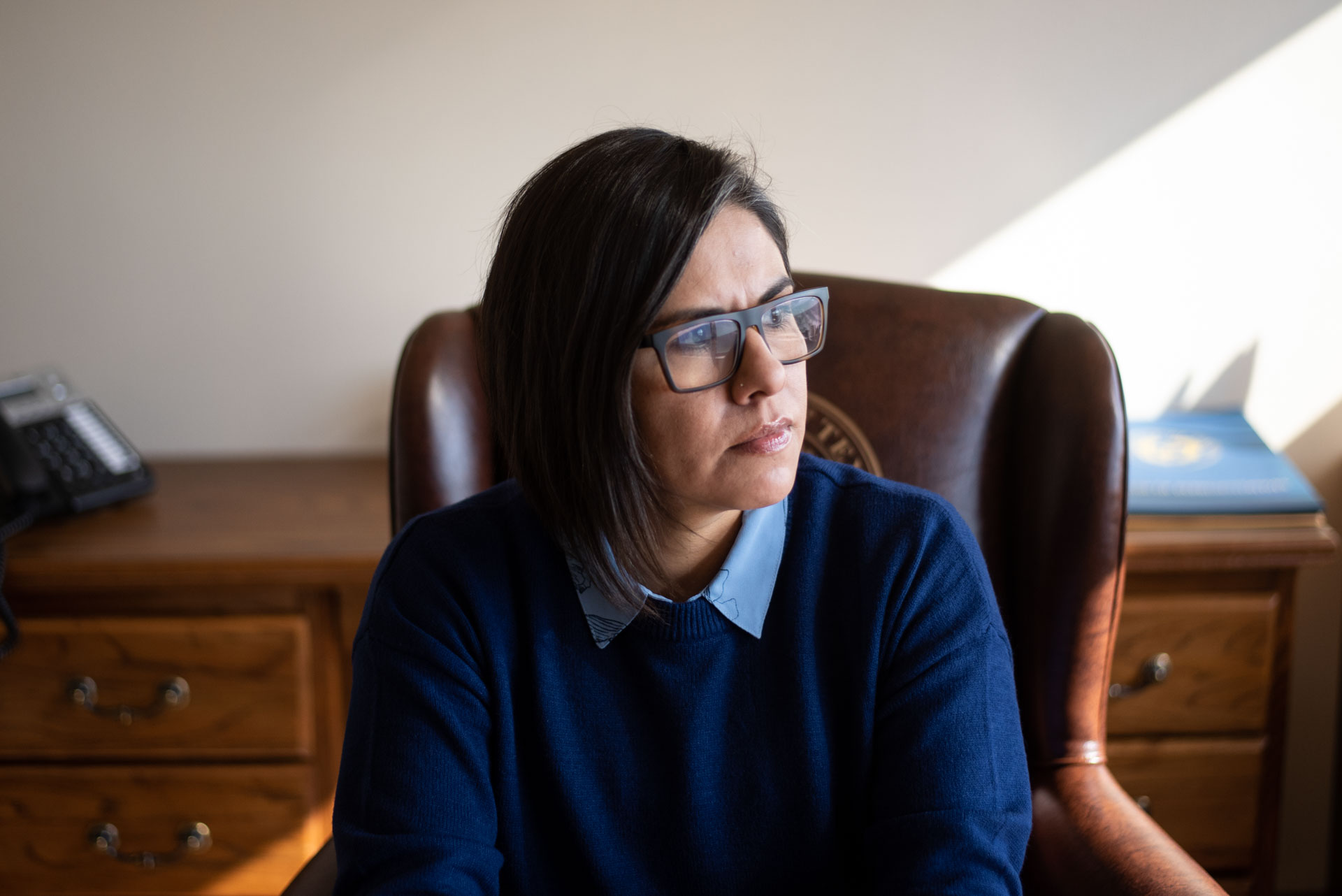
Photography by Emil Lippe
A newswire photo of Rep. Jessica González shows the Texas lawmaker from Oak Cliff in a houndstooth dress and true-blue blazer, arm outstretched with fingers spread, speaking intensely in front of microphones at a press conference on May 30, 2021, the day Democrats walked out of the Texas House of Representatives.
González’s fellow Dems fill in six rows on the steps of a church behind her, but she’s the leader here.
As vice chair of the Elections Committee, González was at the forefront of a political fight over voting rights during the 2021 Texas Legislature.
“This bill is entirely unnecessary, and it’s a hateful piece of legislation,” González told ABC News earlier in May.
Orchestrating a coup to stop the Texas voting bill was the easy part.
“That was probably one of the first times I’d smiled in a long time, when we broke quorum, and we went to the church that night, and there was only about an hour left of session,” González says. “We had just seen Republicans getting their way over and over, and for once, it was like, ‘No, this is too important.’ Sometimes you have to do what’s scary.”
That night in May, Democrats killed the Republican-backed proposal to restrict voting in Texas by leaving the Capitol and preventing a quorum on the House floor. But the bill was resurrected in one of Gov. Greg Abbott’s special-called sessions and eventually passed.
The law is set to take effect before the November election this year, but it is currently embroiled in litigation.
González was born in Oak Cliff, the youngest of four kids, and attended what is now Barbara Jordan Elementary. Her parents are immigrants from Mexico who own a snack business. She graduated from Duncanville High School — coincidentally, also Abbott’s high school alma mater — in 1999.
She attended Mountain View College while still in high school because her calculus class was taught there, and she eventually received a degree in criminal justice from the University of Texas at Arlington.
The late Adelfa Callejo, a Dallas civil rights leader, encouraged her to go to law school after González applied for a job at Callejo’s law firm. She wasn’t hired because, Callejo told her, she was overqualified.
At the time, González was only considering schools nearby because she didn’t want to be far from her family. And she’d scored low on the LSAT despite a stellar academic record.
“She gave me a lot of good advice. She told me to apply for law school out of state,” González says of Callejo. “She said, ‘Apply to all the schools that have free applications and see if you get in.’”
And that’s how she wound up at Western Michigan Law School.
That led her to a string of impressive work experiences, including law extern for the U.S. Department of Justice voting rights section. She spent six months as a White House intern in 2012, working on immigration policy. And she was statewide voter protection director in Nevada for Obama’s second presidential campaign.
She works as a personal injury trial lawyer at her firm, Gándara & González PLLC, in Oak Cliff. She took office in 2018, and she is up for re-election in November. She was criticized in August 2021 for traveling to Portugal while the Texas Democrats were amid another walkout. It was revealed later that González was there to get married. She tied the knot with Dallas native Angela Hale, a senior adviser for Equality Texas and a registered lobbyist who works for LGBTQ+ rights, on Aug. 7.
González first ran for office in 2018, beating longtime incumbent Democrat Roberto Alonzo in the primary
“Initially I wanted to run for city council, but people started asking me, ‘Have you thought about state house?’ I just saw these vulnerable communities who are under attack. It’s personal, and it’s personal for the district.”
She started her firm with Cassandra Gándara, who has also run for political office
We started hearing from folks who were scared about picking up their kids from school or going grocery shopping, so they were trying to get documents to make sure their kids would at least be with a family member or friend if they got deported. We started helping people with those documents, but you should be able to pick your kids up from school and not be afraid. And then there was the “bathroom bill,” attacks on women’s health care and the LGBT community, and I just got really frustrated that there’s something really wrong. It was like this district being under attack. It’s a safe Democrat seat, and it deserves to have someone vocal who will stand up for it. So finally, my law partner was like, “You have to do this.”
Republican Speaker of the House Dade Phelan appointed her to the Elections Committee, likely because of her extensive experience with elections and voting rights
As far as hands-on experience, I knew there was no other House member who had that. It was an opportunity for me to get in there and let my experience work for the people of Texas.
Rep. Briscoe Cain, a Republican from Baytown, served as chairman of that committee
When I saw the appointments, I was like “Oh, Lord.” I was an Obama lawyer, and the chair was a Trump lawyer. He flew out to Philadelphia to try and overturn the 2020 election. We obviously have very contrasting perspectives, so I knew it was going to be a challenge. I decided to focus on my work as vice chair of the committee, to make sure that we’re building a litigation record, because I knew if it passed, there was going to be a lawsuit that followed.
It was an extremely contentious legislative session
As vice chair, unfortunately, I saw firsthand what it is to be a woman, and then a woman of color, in this position. Being disrespected, being ignored, and I saw it even more this session. There were no Black members on the elections committee, and the chair refused to hear the Black caucus. So I coordinated with the chair of the Black caucus, (Rep. Nicole Collier)and I said, “When I’m presiding, I’ll recognize you.” Well the chair abruptly stopped the committee hearing and would not let her speak and demanded the gavel back. So it was very frustrating in that regard. Tons of people would come in and testify that there’s no evidence of widespread voter fraud in Texas, and yet it would still move forward.
Walking out to prevent the vote was an easy decision
It kind of came down to the wire, and when Republicans started to have these backroom conversations, changing the bills. … There were some that would’ve made it really easy to overturn elections, like without any evidence of fraud. … For me, that was it. Democrats came together to use the only power we had.
Being a Democrat in a red state means constantly playing defense
Democrats actually do have a platform. Here in the district, we have problems with affordable housing. How do we balance encouraging economic development and entrepreneurism and help small businesses without displacing people from their homes? And we’re not even able to work on that because Democrats are left to have to just fight the entire time against something like the “bathroom bill” and all these culture wars.
She also fought the “trans sports bill,” which ultimately passed and is meant to prevent transgender girls from participating in UIL sports
People who have been following what’s been happening in our state and across the nation, this is what Republicans do. The “bathroom bill” is a prime example. They’re always going to find a creative way to attack trans children. This time it was trans kids playing sports. So we always have to be vigilant about these issues. I think they might’ve gone too far this time. We will find out in November.
What she’s proud of, from the 2021 Texas Legislature
I’m proud of the fact that I challenged laws based on data. (The walkout) helped make the voting-rights issue in Texas a national issue. It elevated it to a national stage, and it started a robust discussion. I don’t think people knew the egregious behavior that was happening in the elections committee. We were able to defeat all the anti-LGBT stuff in the regular session, and the special sessions until the last one.
On serving a “safely” Democratic district
I feel like I have an even bigger responsibility. There’s no reason I should have the second-lowest turnout district in Dallas County. It’s my responsibility to make sure people turn out to vote. We can’t lose our focus on that. And I think that people just need to know what’s going on — that our rights are under attack. In local elections, sometimes people win by a couple hundred votes, so for people to think their vote isn’t important, that’s just not true.
Interview has been edited for clarity and brevity.





